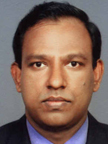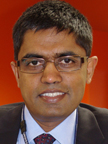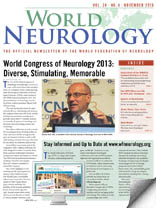By Darshana Sirisena and Professor Tissa Wijeratne
Sri Lanka has an aging population with an impending epidemic of stroke at hand.1,2 Stroke is a leading cause of adult disability in Sri Lanka3,4.
The first stroke master class series conducted in Sri Lanka was launched in April and July 2013. The master class series covered five provinces (nearly 10 million population) and conducted in teaching hospital, Anuradhapura, teaching hospital, Peradeniya, provincial general hospital, Kurunegala, provincial general hospital, Ratnapura and district hospital, Diyatalawa.
This stroke master class series was the latest initiative of Asia Pacific Association of Young Neurologists and Trainees (www.apaynet.org), the Asia Pacific section of International Working Group of Young Neurologists and Trainees (IWGYNT), World Federation of Neurology. APAYNET was established in 2011 as a result of the success of European group of young neurologists and trainees, European section of IWGYNT5,6,7.
The stroke master class series comprises of 11 didactic lectures covering key topics of stroke care range from global burden of stroke, development of stroke services in the limited resource setting, classification of stroke, stroke imaging (master class on interpretation of acute stroke imaging), stroke thrombolysis, primary and secondary prevention of stroke, long-term rehabilitation in stroke. The syllabus ranges from basic science to recent advances in stroke care.
This series was endorsed by World Stroke Organization and aptly supported by a major donation of printed educational material from National Stroke Foundation, Australia.
The Stroke Master Class series was conducted by Associate Professor Tissa Wijeratne, Sri Lankan born, Australia and New Zealand trained neurologists currently reside in Australia, Darshana Sirisena, neurologist from Sri Lanka who is also the Sri Lanka representative of Asia Pacific Association of Young Neurologists and Trainees, Nirodha De Silva, physician with a special interest in stroke medicine and also the director, Stroke services, Base hospital, Diyatalawa, Sri Lanka. The series was aptly supported by several Sri Lankan neurologists and few senior physicians in Sri Lanka.
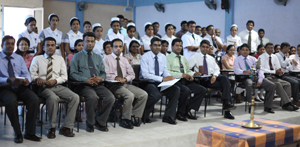
Diyatalawa Stroke Master Class audience.
Despite several challenges, the master class series was a huge success. There were more than 500 delegates, including neurologists, physicians, junior doctors, nurses, physiotherapists, occupational therapists and speech therapists who were involved in stroke management in their day-to-day lives.
The event had in-kind support from department of neurology, WesternHospital, Melbourne, Australia, National Stroke Foundation Australia, Anurdhapura Clinical Society, Ratnapura Clinical Society, Stroke Unit, BaseHospital, Diyatalawa, Sri Lanka, Department of Medicine, Faculty of Medicine, University of Peradeniya, Sri Lanka, which made this series a huge success.
We had lot of positive feedback from the participants of this master class series in Sri Lanka. It was evident that there is a significant thirst at the grassroot level for knowledge of best practice in stroke care. We were invited to come back and repeat the event with further updates on regular intervals in the future by many of them. This implicates the necessity for more opportunities of this nature at a junction where stroke care in countries such as Sri Lanka are trying to keep pace with the rest of the world.
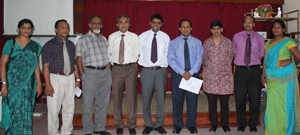
Stroke Master Class audience, Teaching hospital, Peradeniya.
There is no doubt that development of stroke services with whatever the resources available in less resourced countries like Sri Lanka is a top priority at the moment. This can be done and should be done. Reorganization of the services and education are the key factors that will get us toward this goal.
Asia Pacific Association of Young Neurologists and Trainees plan to establish a master of stroke medicine program through similar stroke master class program and open book examination process with the help of Australasia Stroke Physician Network, World Federation of Neurology, World Stroke Organization with a view to address the burning issue of stroke care workforce in the Asia Pacific region as matter of priority in the coming years.
If you are interested in helping us in this process or if you are interested in hosting the stroke master class series in your country, contact us via www.apaynet.org or email twi@unimelb.edu.au.
Sirisena is director of the Department of Neurology & Stroke Services at Teaching Hospital, Anuradhapura, Sri Lanka, Wijeratne is director of Stroke Services and the Neuroscience Research Unit at Western Hospital and the University of Melbourne, Australia.
References
1. Wijeratne T, Gunaratne P, Gamage R, Pathirana G, Senanayake S, De Silva N, et al. Stroke care development in Sri Lanka: The urgent need for Neurorehabilitation services. Neurology Asia. 2011;16(2):149-51.
2. Wijeratne T. Neurorehabilitation in Sri Lanka: an emerging sub-specialty for neurology trainees. Int J Stroke. 2012;7(2):163-4.
3. Gunaratne PS. A step forward in stroke care in Sri Lanka. International Journal of Stroke. 2009;4(4):293-.
4. Gunaratne PS, Fernando A, Sharma VK. Development of stroke care in Sri Lanka. International Journal of Stroke. 2009;4(1):38-9.
5. Macerollo A, Varga ET, Gyorfi O, Kobeleva X, Paterson RW, Sellner J. The European Association of Young Neurologists and Trainees in 2013: striking a blow for European junior neurologists. Eur J Neurol. 2013;20(4):e54-8.
6. Struhal W, Falup-Pecurariu C, Sztriha L, Sellner J. The European Asociation of Young Neurologists and Trainees: advocating young neurologists in Europe. Eur J Neurol. 2009;16(8):e146-8.
7. Struhal W, Falup-Pecurariu C, Sztriha LK, Grisold W, Sellner J. European Association of Young Neurologists and Trainees: position paper on teaching courses for Generation Y. Eur Neurol. 2011;65(6):352-4.
